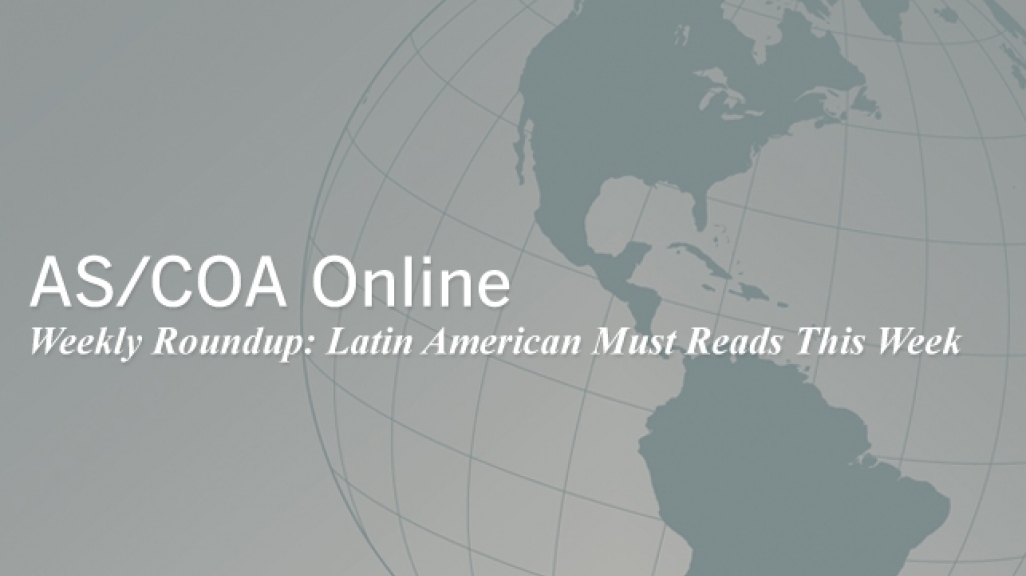Weekly Roundup: Mexico's Telecom Reform, Nicaragua's Canal, Putin's LatAm Tour
Weekly Roundup: Mexico's Telecom Reform, Nicaragua's Canal, Putin's LatAm Tour
Brazil’s presidential campaigns kick off, U.S. and Latin American officials propose solutions to the child migrant crisis, and Peru’s president inks a law to revamp higher education.
Mexico’s Congress passes telecom reform bill. On July 9, Mexico’s Chamber of Deputies passed a bill to implement telecommunications reform in Mexico, which is now awaiting President Enrique Peña Nieto’s approval. The legislation—also approved by the Senate—outlines how the telecom reform passed last year will work in practice. The bill’s centerpiece would limit market share for any single given company to 50 percent for each communications sector. Some elements of the reform are controversial, including possible threats to net neutrality and the retention of consumer data for 24 months for the use of government authorities.
Find out what’s in the telecom law and why the secondary laws are important.
Authorities regroup to address Central American child migrant crisis. On July 8, the White House requested $3.7 billion from Congress to address the ongoing child migrant crisis, saying the funding is necessary for border security as well as housing and judicial proceedings for detainees. President Barack Obama met with Texas Governor Rick Perry the following day in Dallas, urging him to ask his Republican colleagues to pass the measure. Earlier in the week, Mexican President Enrique Peña Nieto and Guatemalan President Otto Perez Mólina announced a five-point plan to protect child migrants. Also, after calling for migrant children to receive refugee status in Mexico and the United States, officials from the U.N. High Commissioner for Refugees met in Nicaragua on July 10 with immigration officials from Central America, Mexico, and the United States to discuss redefining assistance to refugees.
Brazil’s presidential campaigns kicked off. Election campaign season officially began July 6, two days before Brazil’s soccer team was eliminated from the World Cup. Vox and The Washington Post’s Monkey Cage blog look at whether the historic loss could affect President Dilma Rousseff’s reelection chances. Eurasia Group’s João Augusto Castro Neves told Reuters that the historic loss is unlikely to affect the vote, and explained to AFP that there is “no correlation” between World Cup results and presidential elections.
Nicaragua reveals route for canal plan. On June 7, the Nicaraguan government announced the route for a canal that will connect the Atlantic and Pacific oceans. The $40 billion project led by Chinese company HKND Group will begin this year. The canal will cross the southern tip of the country, passing through Lake Nicaragua, and end at the mouth of the Brito River. In response to environmental concerns, HKND Chairman Wang Jing said July 9 that the “canal will be ecological and environmentally friendly.” At nearly 173 miles long, the canal will be more than three times the size of the Panama Canal. Officials also believe the project will create 200,000 jobs.
Find out how the project originated in an AS/COA Online analysis.
Russian and Chinese leaders embark on LatAm tours. Russian President Vladimir Putin arrived in Cuba on July 11, the first stop of a six-day Latin America trip. Discussion will focus on Russia’s commercial projects with the island, including the partial forgiveness of Cuba’s $32 billion debt. Putin will also travel to Argentina and end his trip in Brazil for the July 15 BRICS Summit. The meeting will mark the start of Chinese President Xi Jinping’s tour of the region. He will also attend the Community of Latin American and Caribbean States (CELAC) Summit in Brazil on July 17 before heading to Argentina, Cuba, and Venezuela.
See how Brazil’s trade with China and Russia has evolved in a series of infographics.
Peru’s president signs new education law. On July 9, President Ollanta Humala inked legislation aiming to improve the country’s education system. Passed by the Congress on June 26, the law creates the National Superintendence of University Education, a monitoring body to standardize higher education institutions and raise the quality of education in the country in order to compete internationally.
“Dengue cousin” spreads to Brazil from the Caribbean. Chikungunya, a non-fatal, mosquito-borne illness is spreading in the Caribbean with cases also popping up in Brazil. The disease first emerged in the Americas in December 2013 on the island of San Martin. Since then, the virus has spread throughout the hemisphere and has taken a toll on the Dominican Republic and Haiti, with over 165,000 cases and 51,000 cases reported, respectively. Three cases of the chikungunya fever were confirmed in Rio de Janeiro, Brazil this week, with a total of 20 cases recorded in the country so far this year. Brazil’s Ministry of Health reported that 19 of the patients were infected after traveling to the Caribbean.







